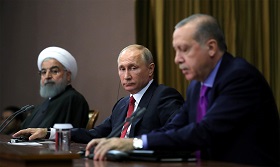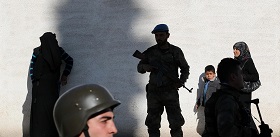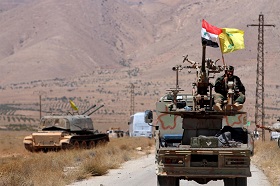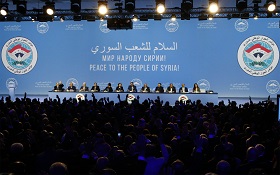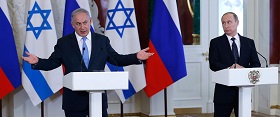Next month will mark seven years since the Syrian Civil War began. Like Russia, Israel has been watching Syria very closely since the beginning of the conflict. The Israeli establishment has security interests in Syria. The situation in southern Syria has recently raised alarm bells within the Israeli establishment due to the presence of Iran and Iranian-sponsored Shi‘a militias on Israel’s northern border. In many instances, it has used aerial force to deter Iran from expanding its influence. The Israeli establishment prioritizes its national security, and certain security issues determine whether it will act in the Syrian arena.
Since its foundation, Israel has based its defense calculations on two concepts: existential security and current security. Existential security concerns the preservation of the very fundamentals of the Zionist enterprise — the preservation of Israel as the democratic nation-state of the Jewish people. Current security is about maintaining the personal safety and well-being of Israelis on a day-to-day basis.
Israel sees Iran as both an existential and current security threat. Iran’s rhetoric of wanting to destroy Israel and, according to Israel, attempting to acquire nuclear weapons makes this a cause for grave concern.
According to Israel, Syrian President Bashar al-Assad has been confrontational towards Israel by aiding and abetting Hezbollah in Lebanon as well as being the conduit by which Iranian weapons are transferred to Hezbollah and other Shi‘a militias. Both Iran and Hezbollah, in Israel’s view, are respectively state and sub-state actors that are a threat to its national security.
Israel was never entirely sure what to expect from the Americans throughout the Syrian Civil War. Presidents Barack Obama and Donald Trump both balked at intervening in the Syrian arena. However, like President Obama, President Trump does not have a complete grip on his administration and it is difficult to tell what the US foreign policy is in Syria.
Russia and Israel share a common concern towards international terrorism spreading throughout the region. When Russia entered the Syrian Civil War, the Israeli government immediately contacted their Russian counterparts. In the Syrian arena, both the Russians and Israelis share the belief that the threat of international terrorism is not only a threat to the region but to the international community as a whole.
Israel’s National Security: What’s at issue?
Since its foundation, Israel has based its defense calculations on two concepts: existential security and current security. Existential security concerns the preservation of the very fundamentals of the Zionist enterprise — the preservation of Israel as the democratic nation-state of the Jewish people. Current security is about maintaining the personal safety and well being of Israelis on a day-to-day basis.
For several decades, Israel has had the good fortune of not having to engage in all-out war with any of its neighbouring states. The country even signed peace treaties with Egypt and Jordan. For decades, however, Israelis have been exposed to a wide range of terrorist assaults: aircraft hijackings, kidnappings, suicide bombings, car rammings, knifings as well as constant rocket attacks. Israelis are, understandably, obsessed with current security — so much that in recent public discourse issues of existential security are being almost completely overshadowed.
At times, Israel’s current security needs are in conflict with the country’s requirements for its long-term existential security. Israel’s continued occupation of the West Bank and Gaza is justifiably seen as an asset in maintaining Israel’s current security. However, this very same occupation erodes Israel’s existential security by undermining its Jewish and democratic character as well as its international legitimacy, and thus has an undeniably negative effect on Israel’s long-term survival.
This is exactly what the late Israeli prime minister Ariel Sharon wanted to avoid. His decision to disengage from Gaza was driven not by rockets but by long-term existential security considerations. Sharon’s goal was to preserve Israel’s Jewish character by ridding itself of any remnants of Jewish settlement and the concomitant direct control over more than a million and a half (now closer to two and a half million) Palestinians in Gaza.
The Israeli military plays a vital role in dealing with current security, which is often intertwined with existential security. They are not mutually exclusive because the ideologies of the terrorist organizations, which Israel deems as a threat to its current security, seek the destruction of the State of Israel, which is a threat to its existential security. The Israel Defense Forces (IDF) feels that deterrence is the best strategy to discourage states (such as Iran, Turkey, Saudi Arabia, etc.) and substate actors (such as Hamas, Hezbollah, Islamic State [Da’esh], Jabhat Fatah al-Sham [al-Qaeda’s Syrian affiliate, formerly known as Jabhat al-Nusra], etc.) from attacking its country. The IDF will not change its deterrence strategy for state and substate actors. This is because both actors occupy land and/or have constituencies; thus, they have something to lose.
Israel has three ‘red lines’ of deterrence that are the deciding factors in whether the IDF will respond militarily: (1) transfer of conventional weapons, (2) transfer of chemical weapons, and (3) any projectile(s) landing on its territory. Israel will respond almost immediately with a strike, usually at the source of the weapons exchange or the point of origin of the projectile. It will strike regardless of where or when the incident occurs, all the while coordinating with its partners that might be affected by its actions. This explains Israel’s rationale for military airstrikes against Iranian, Hezbollah, Syrian, and (Salafi) rebel targets in Syria throughout the Civil War.
A Regional Rumble in Syria: Israel’s Concerns over Iranian presence in Syria
Israel sees Iran as both an existential and current security threat. Iran’s rhetoric of wanting to destroy Israel and, according to Israel, attempting to acquire nuclear weapons makes this a cause for grave concern. Moreover, since 1979, Iran has sought to export its Islamic revolution and, over the decades, it has funded many Shi‘a militias—some of which have emerged in the Syrian Civil War—including Hezbollah. Hezbollah is a Lebanese Shi‘a political party-cum-militia with a strong military presence in Lebanon and now in Syria—a threatening presence on Israel’s northern border. The reason Israel also deems Hezbollah an existential and current threat is because of Hezbollah’s militant aspirations and its stated goal of eliminating the State of Israel.
The question now remains whether Israel will completely engage in the Syrian Civil War due to the recent incidents in southern Syria. Other than engaging in a complete military conflict in Syria, Israel will continue to monitor the developments in Syria, and do whatever is necessary to ensure that its security concerns are addressed. Currently, Israel is disturbed by recent developments, as there is now an Iranian militarily presence directly in southern Syria. The IDF will continue to implement its red line policy. Escalation will only occur if Israel feels provoked by its enemies in the south of (or other parts of) Syria. The higher the provocation, the stronger the response will be. This is why Israel has reacted to developments in the south of Syria by striking military targets, all the while communicating with its Russian partners.
From Israel’s Binoculars: A View of Damascus
While Israel came very close to concluding a peace agreement with Syria in 1949 under President Husni al-Zaim, the two countries (since the 1949 Armistice Agreement) have had no diplomatic ties and are officially in a state of war. They have fought three wars (1948, 1967, and 1973) and were involved briefly during the second Lebanese Civil War when Israel invaded Lebanon in 1982. Prior to 1967, there were hostilities between the two countries in the demilitarized zones (DMZs) as well as continuous shelling and infiltration into the Golan Heights by the Syrians. Since 1967 the two major points of contention are Israel’s demand that Syria recognizes the State of Israel and Syria’s demand that Israel returns the Golan Heights, which Israel conquered at the end of the 1967 Arab-Israeli War. This is the essence of what is commonly known as “land for peace” for any future agreements between the two countries.
According to Israel, Syrian President Bashar al-Assad has been confrontational towards Israel by aiding and abetting Hezbollah in Lebanon as well as being the conduit by which Iranian weapons are transferred to Hezbollah and other Shi‘a militias. Both Iran and Hezbollah, in Israel’s view, are respectively state and substate actors that are a threat to its national security. For the same reason, Israel also views Syria as a national security threat. The Israeli establishment was clearly expecting the al-Assad government to fall to the Sunni jihadist rebels, who were supported by Saudi Arabia, prior to Russia’s limited intervention in September 2015. If the ongoing peace negotiations in Sochi and Geneva are successful, it is almost certain that President al-Assad will remain in power or whatever the warring parties in Syria agree upon. Nevertheless, Israel is concerned about a strengthened al-Assad government remaining in power. That would be the best explanation for why it was recently revealed that Israel is arming some Sunni jihadist rebels. Israel is willing to ally itself with Salafist rebels in order to prevent the “Iranian-Syrian-Hezbollah axis” from proclaiming victory in the Syrian Civil War. Whether this proves to be a wise decision for Israel, remains to be seen.
Russia’s Syrian Foreign Policy: The Israeli’s Vantage Point
Russia intervened in Syria in 2015 at the request of Syrian President al-Assad. Russia has no particular affinity for al-Assad; rather it sees him as the only alternative to an Islamic fundamentalist state. Russia’s main objective is that the Middle East remains stable while Syria was heading towards anything but stability. There are two reasons why Russia entered the Syrian fray.
First, while the Caucasus region is not entirely in Russia proper, it is on its border and presents a “zone of vulnerability.” Given the recent history of US-sponsored “regime changes” in the Middle East, North Africa, and the Caucasus, Russia is on high alert. This is because many Muslim citizens of the Caucasus countries were joining extremist organizations to fill the power vacuums created by US “regime change” policy. This is the main reason why Russia came to the aid of al-Assad’s government in September 2015 in the Syrian Civil War. It did not want to see a chaotic “Libya outcome” in Syria or see Da’esh or Jabhat Fateh al-Sham in Damascus.
The second reason is that Russia has a large Muslim population (estimated at 12-15 percent or 16 million to 20 million ethnic Muslims) that it also fears might become radicalized. Since the breakup of the Soviet Union, Russia deems Islamic radicalization as one of the most serious challenges to its national integrity and stability. A destabilized region will pose grave problems within Russia’s borders. Thus, it has created a strong partnership with Israel to coordinate these stabilizing efforts.
Russia and Israel share a common concern towards international terrorism spreading throughout the region. When Russia entered the Syrian Civil War, the Israeli government immediately contacted their Russian counterparts. It appreciated the concern Russia had towards the jihadist terrorist threat in Syria, but the intervention led to an equally alarming concern for Israel. That is, Israel worried that this would increase Iran’s influence in Syria. This should not be interpreted as a cooling in Russo-Israeli relations. There has always been dialogue between the two governments on all levels. Given Russia’s intervention in Syria, both countries’ military and intelligence apparatuses are in contact in the Syrian arena to avoid unfortunate outcomes. Moreover, Israel relies on Russia to be the intermediary to resolve border issues. We saw this recently in Lebanon and Syria given Russia’s everexpanding presence and many contacts in the region. However, the concerns in Israel regarding Iran in southern Syria still remain. For instance, Israel has made it clear that it is concerned with the recent agreement between the US and Russia for a “zone of de-escalation” in southern Syria. In the view of the Israeli establishment, this prevents Israel from reacting to security concerns in the area—namely, military activities by the “Iran-Hezbollah-Syria axis.” Nevertheless, given the US absence, Israel understands that it must balance between protecting its security and awareness that its activities could, as Russian President Vladimir Putin warned, lead to “a new round of dangerous consequences for the region.” In other words, Israel now understands that it cannot take a militant line in the Syrian arena.
From the Israeli Lens: America’s Policy in Syria
Israel was never entirely sure what to expect from the Americans throughout the Syrian Civil War. Presidents Barack Obama and Donald Trump both balked at intervening in the Syrian arena. However, like President Obama, President Trump does not have a complete grip on his administration and it is difficult to tell what the US foreign policy is in Syria.
Under President Obama, the CIA covertly armed opposition forces, many of which were jihadis (some even linked to al-Qaeda). To his credit, President Obama hesitated to enter the Syrian Civil War, knowing the dire implications of intervention. Unfortunately, his biggest flaw was that he was not in full control of his administration. As a result, powerful forces within the military, foreign affairs and intelligence communities decided to act independently of the President. For instance, President Obama and President Putin agreed to cooperate in Syria to destroy Da’esh and other terrorist organizations after a weeklong ceasefire (organized through their foreign ministries). However, only 48 hours prior to the implementation of full US-Russian cooperation in Syria, the Pentagon sabotaged the efforts made by US Secretary of State John Kerry and Russian Foreign Minister Sergey Lavrov.
While President Trump had ended the CIA program to covertly give weapons to jihadi forces, he too had his fair share of mistakes in the Syrian arena. While mentioning on numerous occasions during the 2016 US presidential election campaign that he wanted to cooperate with Russia in Syria, President Trump has been unable to fully implement his campaign promise due to anti-Russian sentiments in the American political class. As a result, due to his inexperience, he has had to deal with the same conundrum as President Obama. For instance, relying on very weak intelligence that Syrian President al-Assad used chemical weapons on his own people, President Trump authorized a launch of 59 tomahawk missiles on the Syrian Army’s outposts—raising tensions in Syria of a possible ‘hot war’ between the United States and Russia as well as forcing Russian Prime Minister Dmitri Medvedev to proclaim that US-Russian relations were “destroyed” (razrushennyy). While the situation has settled down, the US retains a military presence in Syria, making it unclear what their foreign policy is for Syria. Is the US policy to destroy terrorism in Syria (as President Obama professed at the UN Security Council and President Trump promised during his campaign) or is it, as it was at the beginning of the Syrian Civ-il War, to remove al-Assad from power? Unfortunately, due to infighting in the US foreign policy establishment over alleged Russian interference in the 2016 US election, President Trump does not have a free hand in dictating foreign policy and this includes the Syrian arena. As a result, there is no clear answer.
The Israeli establishment views the ongoing conflict in US politics, as an internal matter but was hopeful that the al-Assad regime would fall. Given that events seem to suggest that al-Assad will remain in power, Israel is acting according to its security concerns. Regardless of what happens (or who is in power) in Syria, Israel will observe its red lines accordingly with caution (given that Russia is the “new sheriff in town”). However, the internal US political struggle has convinced the Israeli establishment that the Americans are retreating from the Middle East. There has been no significant US military presence in the region for over a decade and the US has been coming less and less to Israel’s defense on the political scene. This has made it increasingly hard for the Israelis to rely on and seek political assistance from their American partners. Having said that, the Israeli estab-lishment still considers the US its number-one ally. While some might consider US bipartisan support for Israel to be on the wane, the two countries share decades of deep ties in the political, economic, cultural, military, and intelligence spheres. In other words, they share the same values and it is highly unlikely that the Israelis and Americans will com-pletely relinquish this relationship for the foreseeable future.
Russo-Israeli Relations: Détente or Full-Partnership?
To conclude, the question must be asked: can Israel and Russia find common ground? That answer is yes. Israel’s two major national security concerns converge with Russia’s. While the current Israeli government sees no interest in seriously negotiating for a two-state solution, Russia, like the Israeli Left, understands that a two-state solution is the most viable and practical answer to the ongoing Israeli-Palestinian conflict. This would address Israel’s existential national security concern and, by extension, significantly reduce its current security concern. If both parties (Israeli and Palestinian) are serious about negotiating, Moscow is more than willing to be that broker to resolve this matter—as we saw in 2016. In the Syrian arena, both the Russians and Israelis share the belief that the threat of international terrorism is not only a threat to the region but to the international community as a whole. Where the two countries’ national security concerns do not converge is on Iran, specifically the “Iranian-Syrian-Hezbollah axis.” Nonetheless, here too we see cooperation. The two countries have found a way to communicate when their countries’ security concerns are at odds. Even so, they continue to cooperate on a military and intelligence level in the Syrian arena. There are big changes afoot in the global arena. Unlike the Cold War era, the United States is retreating from the region. Israel will have to rely more and more on Russia to resolve security issues. The ball is in the Israelis’ court to make that decision. Russia shows that it is willing to be Israel’s primary partner in the region; Israel must do the same.


